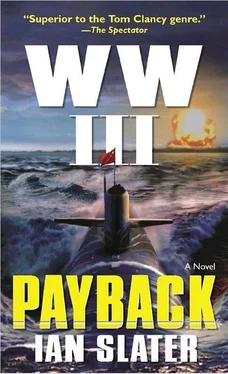For a moment he felt boyishly self-congratulatory, as if what in fact had been his relatively rare sexual adventures with the two women had been more regular occurrences. And his mind was in good shape too. The White House — well, maybe just Eleanor, but she was the President’s National Security Advisor — was sending an FBI agent to confer with him. That was something.
Staring at Margaret’s diamantine-studded ceiling, his postcoital mood growing into one of self-satisfaction about his knowledge of things military, he failed to remember his late wife’s gently reminding him of St. Paul’s First Letter to the Corinthians, that “knowledge puffeth up!” And so, it was an embarrassing blow to the legend’s ego when Margaret, albeit gently, suggested that he might want to — well, brush his teeth, before the government man arrived.
The general didn’t simply blush; his face turned beet red in a surge of embarrassment, exacerbated by the fact that, necessary body odor during missions notwithstanding, General Douglas Freeman was known as a stickler for personal hygiene. “My God!” He sat up. “I’m sorry.”
“I think it was the onions you had.”
“But,” he spluttered, “they were Walla Walla!”
The name sounded so funny, she burst out laughing. “Walla what?”
He’d never seen her so girlish, so playful, so wonderfully relaxed. “You betcha,” he avowed. “Walla Walla. World famous. So mild, you can eat ’em raw. My old man used to eat them like an apple.”
“Oh, toosh!” she laughed.
“Toosh yourself!” he said, throwing her pink lace panties at her.
“Oh,” she said, “you bully!”
“Bully’s better than bad breath!”
“Silly, it’s not that strong. I just thought I should tell you before your meeting. Honestly, Douglas, I don’t mind.” She’d been laughing so much that she placed her right palm against her bosom as if to steady her heart, her breasts rising and falling rapidly, revealing her nipples dark and sharp against the pink silk, so that he was ready to go again.
“Well I mind,” he said. “Walla Wallas aren’t supposed to stink.” He was cupping his hand in front of his mouth to get the full effect. She was right. It wasn’t that strong a smell but there was a distinctly off-putting odor. “That’s it. I’m through with Walla Wallas!”
“You can eat a ton at lunch,” she joshed.
“No I can’t. How could I be—,” he began, with mock shock, “—be intimate with you, smelling like this?”
“Oh, Douglas,” she said, clearly touched. She watched him as he walked into the bathroom, where he vigorously brushed his teeth and took a strong swig of blue mouthwash, his gargling the most frightening sound, like some mechanical monster chewing up a swamp. She giggled again. No man had ever shown her such prompt consideration. A small thing to others, perhaps, but for her, in a world of terror and unspeakable vulgarity, it was the immediacy of his response that was the act of a true officer and a gentleman. She felt so extraordinarily young. It was true: you were as young as you felt. In the mirror you saw the body you inhabited, the bone and flesh that confined your youth, your hopes and dreams, like prisoners in a cell, but at last her passion was wild and free. She felt so happy, it seemed as if her heart couldn’t contain her joy. She burst out laughing again, “Walla Walla!” holding her panties as a veil against her face. All he could see was her eyes, their sparkling aquamarine in vivid contrast against the filigree of pink lace she held cheekily against her mouth.
Monterey’s FBI agent Patricia Grant was taken aback. Never in her fifteen years with the agency had she had an interviewee phone up her regional office to check out her ID card number and insist on a detailed physical description — distinguishing marks, eye color, et cetera. So this was the guy they called “George C. Scott,” “Patton,” and a “has been” prima donna. What’s more, he asked her — not impolitely but certainly directly — why she hadn’t asked him to see his ID, driver’s license, Social Security number, et cetera.
“I checked your file before I came, General,” she lied. She could have said she’d heard all the good things about him, but to hell with it — she was miffed at Freeman for checking her out.
“No offense,” he said, extending his hand, smiling graciously. “And it’s not because you’re a woman. I check out everybody. A sign of the times.”
He was right about that.
“I’m to chauffeur you to our office,” she told him.
En route along the Pacific Highway to the FBI HQ office in Monterey, the general was admiring the endless blue of the Pacific, struck by the agent’s insistence that all the windows in the unmarked black Ford sedan be closed.
“I like to smell the sea air, even if it is a bit chilly,” said Douglas.
“Same here,” said Patricia Grant, tempted to add, “ ’specially when the car reeks of Listerine.” Instead she proffered, “But rules are rules, I guess. These days, windows have to be up. Agency regulations.”
She was right, but he thought it one of the most distressing comments he’d heard, along with the babble of network “experts” who obviously couldn’t tell the difference between an Igla, a Vanguard, or a Stinger. Distressing because she was right. Americans who, perhaps of all nationalities on earth, prized the freedom of the open road and the quintessential American invention, the convertible, the most had retreated, turtlelike, under a hail of bureaucratic alerts and concomitant rules into speeding cocoons of darkened, bulletproof glass in paranoid dashes between destinations, for fear of attack in their own country. It was a surrender of a kind, an undeniable admission trumpeted by foreign media that already the terrorists and affiliated scumbags had won a significant victory over America.
On the radio, Freeman and agent Patricia Grant heard that all commercial flights were being suspended for the next seven days.
“For the airline industry,” said Patricia, “today’s worse than 9/11. We have to do something.”
Freeman heard her but her words didn’t really register, the general experiencing a moment that was referred to in the work of the famed Austrian clinical psychologist Dr. Ernst Riefelmann as a rückwärtige Verbindung —a “reverse connection”—during which we work back from an apparently innocuous remark, a remark seemingly unconnected to our present overriding concern but which is in fact an unconsciously bred connect, “a mental bridge” by means of which two events that initially appear to be unconnected are actually intimately linked. Great investigators, including great generals and captains of industry, Riefelmann had pointed out, are invariably skilled, whether they consciously know it or not, in this Zusammenschmelzen, or “fusing,” of the two or more parts of a bridge or “connect” between seemingly unrelated events.
One of the best known and frequently cited examples of Riefelmann’s “reverse connection” theory had been George Patton’s recurring and disturbing dream in the bloody spring of 1944, a dream in which Patton was haunted, or, in Riefelmann’s terms, obsessively verblùufft, “puzzled,” by the apparent disconnect between the hand carts Patton had seen in his dream and scores of dead Wehrmacht soldiers. For a time, Patton could make no sense of these two seemingly unrelated elements, but eventually it came to him: the once invincible mobile spearheads that formed the second stage of the Blitzkrieg, after artillery and screaming aerial bombardment, were out of gasoline, the carts being the Germans’ only way of moving the dead and, more vitally to Patton’s Third Army, their supplies. The message of the connect? — the German Army was finished, literally out of gas, no longer mobile, at the edge of total collapse, which Patton realized was an unprecedented chance for the Allies to surge ahead instead of following Montgomery’s more cautious and time-consuming advance, during which, Patton feared, the Nazis might get their second wind and thus draw the war out much longer.
Читать дальше












